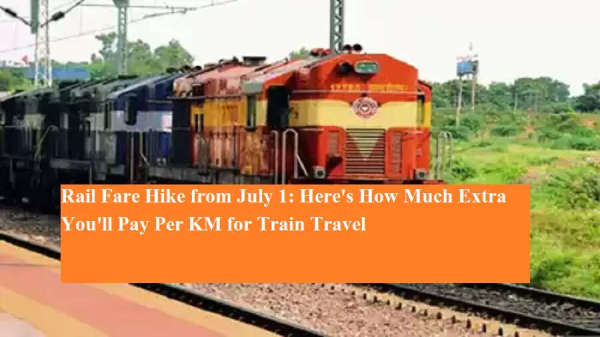
Train Travel to Get Costlier from July 1: Indian Railways Hikes Passenger Fares After 5 Years
If you’re planning to travel by train anytime soon, get ready to spend more on your journey. The Indian Railways has officially announced a passenger fare hike effective from July 1, 2025 — the first increase in basic fares in the last five years.
This fare revision will apply across multiple classes, although certain categories like suburban trains and MST (Monthly Season Tickets) remain untouched.
Let’s break down the key changes and what they mean for your wallet.
Starting July 1, 2025, the fare hike will be applicable as follows:
Second Class (Ordinary): Increase of ₹0.005 (half paisa) per kilometer
Mail/Express Trains: Increase of ₹0.01 (1 paisa) per kilometer
Air-conditioned (AC) Classes: Increase of ₹0.02 (2 paise) per kilometer
Suburban Trains & MSTs: No change in fares
While the per-kilometer increase may seem minimal, the cumulative impact on long-distance travel and frequent commuters can be significant, especially in air-conditioned classes.
This is the first fare hike since the COVID-19 pandemic began in 2020. Railways officials cited rising operational costs, infrastructure modernization, and the need for improved passenger amenities as the primary reasons for the price revision.
With the government pushing for better train services — including new Vande Bharat routes, upgraded platforms, and electrification projects — the fare hike is expected to help generate additional revenue for funding these upgrades.
Let’s consider an example:
A 500 km journey in Mail/Express (sleeper class) will now cost ₹5 more
The same journey in AC class will cost ₹10 more
For second-class unreserved travel, the increase will be ₹2.50
While this may seem modest, frequent travelers and daily commuters — especially in non-suburban zones — will begin to feel the pinch over time.
To provide relief to daily commuters in urban areas like Mumbai, Kolkata, and Chennai, the Railways has decided to keep suburban train fares unchanged. Monthly Season Ticket (MST) holders, who form a large part of the daily passenger base, will also see no hike.
Railway sources estimate that this modest fare increase could add hundreds of crores in annual revenue, especially given that Indian Railways carries over 2 crore passengers daily.
This revenue is critical for:
Enhancing passenger safety
Deploying advanced coaches and locomotives
Maintaining punctuality and operational efficiency
Expanding semi-high-speed train services
Although fare hikes are never welcomed with enthusiasm, Indian Railways insists this is a balanced step, ensuring that ticket prices remain affordable while also supporting modern infrastructure goals.
Passengers can expect improved service quality in the coming months, including:
More Vande Bharat and Amrit Bharat trains
Better onboard catering and Wi-Fi facilities
Cleaner stations and toilets
Higher punctuality and safety standards
After five years of stable ticket pricing, Indian Railways is revising fares to align with its expansion and modernization efforts. While the per-kilometer hike may seem minor, long-distance travelers should prepare for slightly higher expenses from July 1, 2025.
Tip: If you’re planning a journey in July or later, book your tickets early to factor in the new fares.